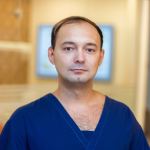Our doctors
Doctor's profile

Dubova Viktoriia Viktorivna
Experience: 6 years
Ophthalmologist; Pediatric ophthalmologist
Nearest slot:
01 June 10:00
Doctor's Services
View all services
About this Doctor
Work experience: 5 years
Education:
- Pirogov Vinnytsia National Medical University
Areas of professional development:
- continuous professional development, attending courses, scientific conferences and seminars;
- studying new trends in ophthalmology with the help of Internet resources.
Priority areas in clinical practice:
- preventive examinations of children from birth;
- conservative treatment of ophthalmic pathology of the anterior and posterior segment of the eye;
- orthokeratology (selection of contact lenses worn at night);
- direct and indirect ophthalmoscopy, ophthalmometry, biomicroscopy, determination of visual field, measurement of intraocular pressure, determination of color sensation;
- first aid (removal of foreign bodies from the eye surface);
- selection of spectacle and contact correction of varying complexity for all types of incorrect refraction.
- "Orthokeratology is a modern, non-surgical and unique method of correcting myopia in children using rigid gas-permeable contact lenses worn at night. This method provides 100% vision without the need to wear glasses or soft contact lenses during the day. The effect is achieved by changing the front surface of the eye with a night lens. This method is completely reversible, which means that stopping the use of lenses will not cause any harm to health. Nighttime lenses are one of the best solutions for vision correction in children and adolescents."
Hobbies, favorite movies, books:
- "I love sports and music, as well as hiking in the mountains - for me it is meditation and relaxation, it is a separate kind of pleasure. They help me to take a break from everyday worries, reboot, relieve stress and solve problems, and reconsider my outlook on life."
Doctor's advice:
- "It is important to remember that a healthy life is based on a balanced lifestyle. Start your day with a positive attitude and end it with a smile. Eat a healthy diet, engage in regular physical activity, and take care of your mental health. Undergo regular medical examinations and consultations to help identify and prevent possible diseases. A proactive attitude to health contributes to a long and quality life."
Terms of online services
Public contract for the provision of medical services
Terms of vaccination services
Patient verification
2012 - 2025 Dobrobut MN. All rights reserved










%402x.png)
%402x.png)
